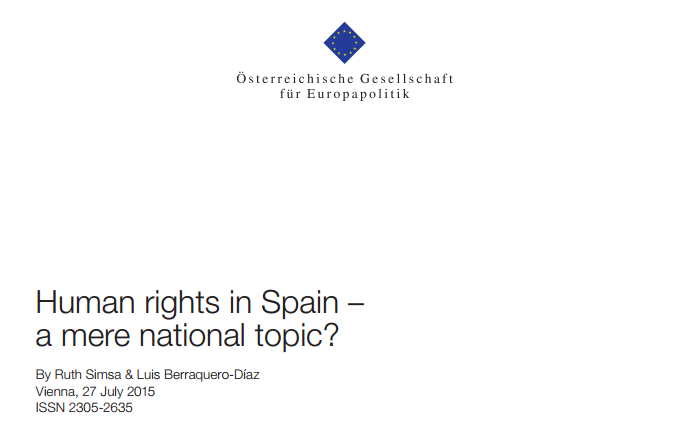Policy Recommendations
- Europe must respond to the recently toughened Spanish law on public security that is bound to lead to a severe restriction of civil rights.
- The observation and documentation of human rights violations in EU member states should be improved.
- An active role of European politics in fostering civil and social rights in all member states would comply with its crucial values and could increase trust in the EU.
Abstract
Millions of Spanish people have been protesting against austerity policies and their consequences. The Spanish government has responded with a law on public security that leads to a severe restriction of civil rights to demonstrate and protest. In recent years, activists have already faced increasing repression, with a rise in financial penalties and arrests as well as bodily harm even in nonviolent demonstrations. With the new law on public security, civil rights have been even further restricted: High penalties are foreseen for activities that form the core of the civic right to express opinions and protest. Spain is not the only European country weakening human rights protection. This development should not be treated mainly as a matter of national affairs. It threatens essential aspects of the European political culture and its values.
*********************************
The protest movement as a consequence of the social and political crisis
The crisis in Spain has led to a massive protest movement that started in 2011 and is still very active, with people protesting against evictions, for better living conditions and for participation. It was established first through demonstrations and city square occupations, later by other forms of political expression, such as the blocking of evictions following mortgage foreclosures, citizen-based legislative initiatives, social centres in occupied houses and others. Thus, we are witnessing a massive increase in nonviolent civil society protests, activism, voluntary self-organisation and other forms of civic engagement (García Espín, 2012). Also, new parties emerged in connection with the movement that have profoundly changed the national political sphere.
Thus, in Spain frustration with politics, dwindling solidarity and the rise in popularity of extreme right-wing parties providing simplistic answers to society’s problems (Flecker, 2007) is far less pronounced than in other countries severely hit by the financial crisis. On the contrary, there is growing solidarity, expressed by a multitude of initiatives that opt in nonviolent ways for inclusive and socially balanced development. Also, interest in politics, political discussions and the readiness to involve in politics have increased.
Repression as an answer to social mobilization?
Already, in the past years an increase of repression of activists has been observed (Garcia 2013), with a rise in financial penalties, the misuse of existing laws and police power. Despite the cuts and the austerity policies, the interior ministry increased public spending on anti-riot equipment from € 173,670 in 2012 to € 3.26 million in 2013[1]. While Spain was called to order several times for police torture cases before the rise of social activism[2], police brutality has been denounced by the Council of Europe in 2013[3]. Amnesty International has documented alarming incidences of police violence against protesters, including the use of clubs and rubber bullets (2012). In a qualitative investigation (Simsa et al., 2015), many examples have been shown. Along with an increase in police repression, the criminalization of social protests has been incorporated in social media and government discourses. The tendency to associate any social protest with terrorism has been reinforced in recent years[4]. With the new law on public security, this so far symbolic criminalization could incur formal punishment.
The new law on public security and the criminal code reform
The government has reacted to ongoing protests with more rigorous legislation that offers more options to impose restrictions on civil society activists and reduce Spaniards’ rights of freedom of assembly and expression. The new law on public security, ratified on July 1 seeks to limit protests by laying out strict guidelines on when and where protests can take place and by penalising offenders with steep fines.
Basically, the reform consists of three parts: First, the reform of the criminal law allows higher penalties. Second, the antiterrorist law formulates a very wide and open definition of terrorism. Third, the law on public security curtails the rights to protest and demonstrate.
With the objective of alleviating the caseload of courts[5], the criminal law reform in many cases now defines infringements as misdemeanours. Disobedience to authority, previously considered a criminal offence, is now considered a misdemeanour. Thus it will appear as criminal record.
Under the reformed antiterrorist law, people can be punished for being potentially dangerous. Based on an ambiguous and broad definition of terrorism, the proposed reform amplifies police rights to detain people preventively, thus not only penalizing actual acts but also potential threats, without further specifying these threats. The affray concept is also introduced in the criminal law reform, which also defines the threat of an affray as an offence. (Pérez Cepeda, 2014)
The use of administrative sanctions is bound to rise. In a recent report, the Commissioner for Human Rights of the Council of Europe expressed his concern with this change, which – by changing from a presumption of innocence to the presumption of guilt – constitutes a violation of the freedom of expression and of association (CommDH 2013, 18). Apart from the overloaded judiciary system, the less stringent requirements of administrative law compared with criminal law are seen as the main reason for the proposed change. A representative of the civil society group “Legal Sol”, which was founded by lawyers to defend activists’ rights by offering them pro bono legal aid, said that in the last two years the group supported 493 activists in trials[6]. Only 6% of them were found guilty. “This is the real reason for the new law”, explained the lawyer: “They are not successful in court because judges demand clear evidence. Now police can impose fines without further proof. Accused persons can appeal at court, but they have to pay the fine first and appeal at their own risk.”
The new law allows e.g. for fines of up to € 30,000 for disseminating photographs of police officers using violence against citizens. This could lead to a reduction of the freedom of the press by invoking self-censorship among journalists, especially those that are working for independent media. Activities that are described as “disturbances of public safety”, such as protests near government buildings, can also be fined with up to € 30,000. People participating in demonstrations outside parliament buildings or key infrastructure, such as transportation hubs, nuclear power plants, refineries and telecommunications installations, can be fined up to € 600,000. Insults of police officers could be fined up to € 600. Attempting to prevent evictions could lead to fines of € 30,000. Failing to notify authorities about demonstrations in public areas would be fined with up to € 600. The new law also entitles police in Spain’s North African enclaves of Ceuta and Melilla to summarily expel migrants caught trying to enter Europe by storming border fences.
The Spanish government argues, that the law is going to increase public security[7]. There is a high number of unauthorised protests and evictions as well as the surrounding of high institutions of the state are frequently blocked. Massive critiques of the political establishment are being formulated and expressed in activities, which can be judged as too radical like occupying houses or demonstrating in front of private houses of politicians.
On the other hand, the law has been heavily criticised by opposition parties as an attempt by the government to hinder protests over its political strategies and the high level of corruption[8]. More than 8o per cent of the population is against the legislation.[9] The legislation has also been widely criticised outside Spain, e.g. by UN human rights experts, working with the Human Rights Council, noting that the reforms “unnecessarily and disproportionately restrict basic freedoms”[10]. Human rights groups say the law is the Spanish parliament’s attempt to “gag” the public (Amnesty International 2014, Greenpeace 2014). Spanish civil society groups are challenging both the use of existing law and the reforms, above all through the protest platform “We are no delinquents”, which encompasses more than 100 organizations and groups[11] (No Somos Delito, Manifesto, 2013). They invent new forms of activism, such as “virtual demonstrations” using projected holograms of protester and criticise, that a clear and strong reaction of the European Union is being missed so far.
The tentative criminalization of protest – an issue for the European Union?
Both the reformed law and the use of existing law, are potentially criminalizing specific movement tactics and restrict activism (Amnesty International, 2014). Some of the planned campaigns to raise awareness of the consequences of the new law have already been suspended because of possible legal consequences for those involved.
The topic has to be handled with finesse. While on one hand it is necessary to protect public security and to prevent radical activities that restrict the civil rights of others, on the other hand civic and nonviolent political activism, especially of young people, should rather be encouraged than restricted.
Although this topic is at first sight primarily concerning national law, it should be seen as a European concern. Spain is not the only country restricting free assembly and expression. Violations of human rights are to be found in many EU member states (Human Rights Watch 2014)[12].The EU is a political project based on common values of human rights, democracy and seeking compromise in conflicts. As outlined in the EU Strategic Framework and Action Plan on Human Rights and Democracy, adopted by the Council of the EU in June 2012, this means securing rights for everyone within the Union. Freedom of association and of expression form core values of the European Union. These fundamental values must be protected more vigorously, in line with the European Council Conclusions of 2013, which recognized that human rights violations in EU member states must be more adequately addressed. According to the Human Rights and Democracy Network, the EU has well-developed institutional arrangements that could be deployed effectively to further promote and protect rights within the EU and strengthen its response to human rights abuse within its own borders.[13]Based on monitoring mechanisms for threats to civic rights, legal mechanisms for preventing member states undermining European values should be developed.
Confidence in the European Union is at a historically low level (European Commission, 2014a)[14]. Frustration with politics and distrust often lead to political inactivity of especially the young Europeans. In a situation where Europe is in danger of losing its youth to political inactivity or extreme right-wing tendencies in many EU countries, the criminalization or the potential restriction of peaceful activists is a dangerous signal not only for Spain and Spanish people but also for the rest of the Union. Opening the door to a further undermining of civil rights and the criminalization of a widespread nonviolent civic movement would widen the gap between institutional politics and young Europeans even further.
1) www.elmundo.es/elmundo/2012/10/30/economia/1351613307.html www.eldiario.es/politica/Interior-dispara-gasto-antidisturbios_0_136136671.html
2) See www.prevenciontortura.org/documentos/ politica.elpais.com/politica/2013/04/29/actualidad/1367264744_739709.html
3) https://wcd.coe.int/com.instranet.InstraServlet?command=com.instranet.CmdBlobGet&InstranetImage=2389885&SecMode=1&DocId=2077824&Usage=2 www.publico.es/politica/denuncias-torturas-policiales-terminan-condena.html
4) www.eldiario.es/escolar/ETA_6_58854139.html www.publico.es/politica/increibles-miembros-eta.html
5) Source: Interview with representative of Legal Sol
6) Source: Interview with representative of Legal Sol
7) www.theguardian.com/world/2015/mar/12/spain-security-law-protesters-freedom-expression; time.com/3944245/spain-security-law-ley-mordaza-dictatorship-censorship-gag/
8) nosomosdelito.net/sites/default/files/public_files/manifiesto_nosomosdelito.pdf
9) www.equaltimes.org/spain-s-gag-law-spectre-of-an
10) www.ohchr.org/RU/NewsEvents/Pages/DisplayNews.aspx
12) www.hrw.org/news/2013/08/05/strengthening-european-union-s-response-human-rights-abuses-inside-its-own-borders
13) www.hrw.org/news/2013/08/05/strengthening-european-union-s-response-human-rights-abuses-inside-its-own-borders
14) ec.europa.eu/programmes/horizon2020/sites/horizon2020/files/External%20advice%20and%20societal%20engagement-SC6-2016-2017.pdf
- Amnesty International (2014) España: El Derecho a Protestar, Amenazado, available:www.amnistiacatalunya.org/uploads/media/Informe_Espanya_el_dret_a_protestar__amenacat.pdf
- Amnesty International (2012) Actuación policial en las manifestaciones en la Unión Europea (Police behaviour during protests in Europe), AI: EUR 01/022/2012. Available: www.amnesty.org/es/library/asset/EUR01/022/2012/es/1ce3a468-55df-4e85-8200-7881076b5204/eur010222012es.pdf
- Council of Europe (2013) Commissioner for Human Rights Report, available: https://wcd.coe.int/ViewDoc.jsp?Ref=CommDH(2013)18&Language=lanSpanish&Ver=original.
- European Commission (2014a). Public Opinion in the European Union
- Flecker, J. (2007). Changing Working Life and the Appeal of the Extreme Right. Contemporary Employment Relations Series. Aldershot: Ashgate
- Flesher Fominaya, Ch. (2015): The State Strikes Back: The Criminalization of 15-M and Social Movements in Spain. https://austerityprotests.wordpress.com/2014/06/05/the-state-strikes-back-the-criminalization-of-15-m-and-social-movements-in-spain/ 15.6.2015
- García Espín, P. (2012). EL 15M : DE VUELTA AL BARRIO COMO ESPACIO DE LO POLÍTICO. Revista Internacional de Pensamiento Político, 7, 291–310.
- García, O. J. M. (2013). Soft Repression and the Current Wave of Social Mobilisations in Spain. Social Movement Studies, 13(2), 303-308. doi: 10.1080/14742837.2013.863147
- Greenpeace (2014) No a la Ley Antiprotesta: Análisis de la reforma de la Ley deSeguridad Ciudadana, Febrero 2014, Available:www.greenpeace.org/espana/Global/espana/2014/Report/general/ley_antiprotesta_web.pdf
- Human Rights Watch (2014): World Report 2014. www.hrw.org/world-report/2014/country-chapters/european-union
- Pérez Cepeda, A. I. (2014). Justificación y claves político-criminales del proyecto de reforma del Código Penal de 2013. Ars Iuris Salmanticensis, 2, 25–35.
- Simsa, R./Heinrich, M./Totter, M.: (2015): Von der Puerta del Sol ins Europaparlament. Organisationale Ausdifferenzierungen der spanischen Protestbewegung. Neue Soziale Bewegungen 2015. forthcoming
- No Somos Delito (2013) Manifiesto, Available: nosomosdelito.net
ISSN 2305-2635
The views expressed in this publication are those of the authors and not necessarily those of the Austrian Society of European Politics or the organisation for which the authors work.
Citation
Berraquero-Díaz, L., Simsa, R. (2015). Human rightsin Spain – a mere national topic? Vienna. ÖGfE PolicyBrief, 27’2015








